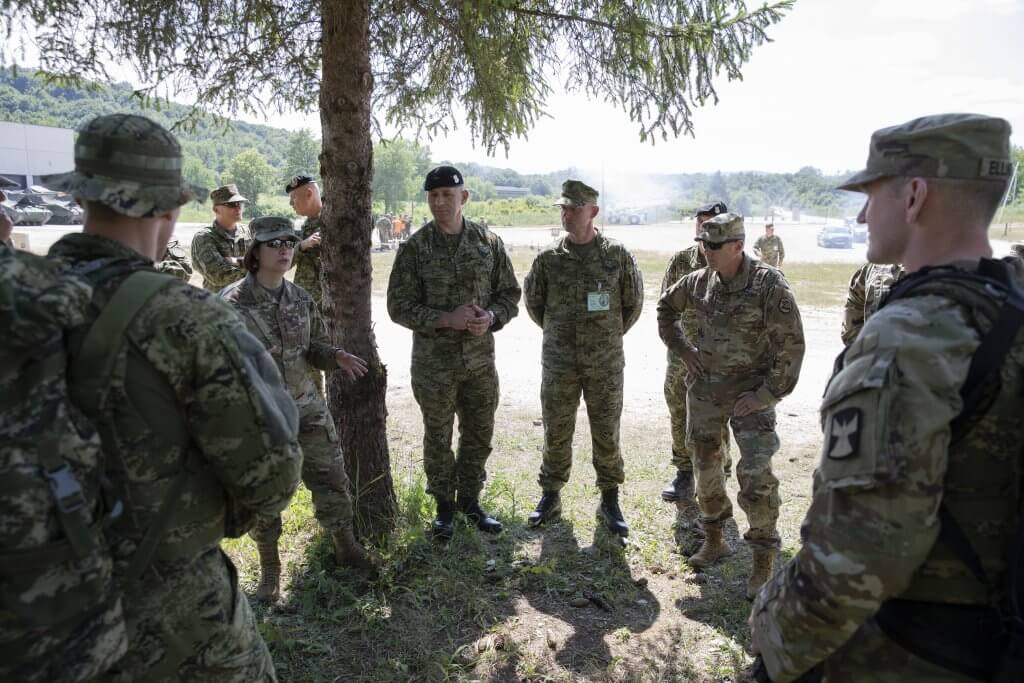The State Partnership Program has expanded to include 83 partnerships with 90 nations around the globe, according to the National Guard Bureau.
Known as the SPP, the program is administered by the Bureau but executed by the state’s adjutants general in alignment with Department of Defense policy goals.
Many of these partnerships are with countries that were once part of the old Soviet Union or were among the Eastern Bloc countries allied with the Soviet regime. North Carolina National Guard, as an example, is partnered with Moldova, Tennessee National Guard partners with Bulgaria, and Illinois National Guard has a partnership with Poland.
Earlier this year, Minnesota National Guard celebrated the 25th anniversary of its partnership with Croatia, a former Eastern Bloc country that became a member of NATO in 2009, according to a press release.
Senior Croatian military leadership visited Camp Riley last month where they met with Minnesota Gov. Tim Walz and became familiar with the UH-60 Black Hawk.
Adm. Robert Hranj, the Croatian Chief of Defense who was part of the delegation visiting Camp Riley, praised the SPP relationship, which he said has helped make them stronger.
“We came out of the war-torn country, we joined NATO, we joined the EU, we’ve participated in many international operations, many times with Minnesota National Guard units, making on some occasions joint units,” Hranj said. “And for all these changes in the Croatian military, cooperation with the Minnesota National Guard played a huge role.”
RELATED: Program puts Guard units side by side with international partners
Maj. Gen. Michael Wickman, commanding general of the 34th Red Bull Infantry Division, referred to the relationship as a “bedrock of professionalism.” He said the partnership helped build a relationship of trust and cooperation between both countries, which included sending joint mentoring teams to Afghanistan in 2008.
“That was such a significant measure of operational success for this partnership program,” Wickman said. “It shows interoperability in a combat situation.”
Retired Lt. Col. Greg Scofield served as the bilateral affairs officer for the Minnesota National Guard from 2002 until his retirement in 2011 and was helping, early on, to build that relationship, shortly after the Croatian military joined the SPP.
“We helped lay the ground work for the Partnership for Peace Program, which helped them get admitted into NATO,” he said.
The California Army National Guard, which began partnering with Ukraine in 1993, has one of the longest relationships in the SPP. The partnership, which began just two years after the Soviet Union collapsed, has played a key role in enhanced soldier readiness and helped build an unbreakable spirit of cooperation between the two nations.
“The California National Guard partnership with Ukraine contributes to our military readiness by strengthening our individual service members’ knowledge of their military occupational specialty,” said Lt. Col. Brandon Hill, who serves as the director of Strategic Communications for the California Military Department. “It is one thing to know how to do your own job, but it develops core competencies by training a member of a foreign military that same skill set.
“This can be something as simple as a small team of our soldiers who trained some vehicle mechanics from the Armed Forces of Ukraine on how we do maintenance, order parts, and report vehicle maintenance, which sharpens the skills of those non-commissioned officers and enlisted soldiers by giving them real world training opportunities.”
RELATED: Malaysia and Washington State partner for exercises
In September 2006, members of California Air National Guard participated in a joint emergency readiness exercise with the Ukraine military that also included Moldova, Georgia, and Azerbaijan. And in 2015, CANG members deployed to Ukraine to train their troops for a possible conflict with Russia.
Since the start of the COVID-19 pandemic, travel has completely stopped, which has resulted in the CANG and Ukrainian military relying on alternative means of training.
“In the past year, the State Partnership Program was able to execute multiple virtual engagements with our Ukrainian partners focusing on NATO staff functions, medical readiness, recruiting and retention, and officer career management,” Hill said. “The exchanging of best practices between CANG and Ukrainian military personnel has significant benefits for both parties.
“We each learn from each other, share experiences, and broaden our understanding of the topics being covered. At a minimum, our engagements serve as a physical representation of the United States’ unwavering commitment to Ukraine’s sovereignty in the face of Russian aggression.”
Hill praised the nearly 30-year partnership with Ukraine, which he said has helped make both countries better prepared to meet international challenges — particularly those in Europe — adding that he’s hopeful that the partnership can last for many more years.

